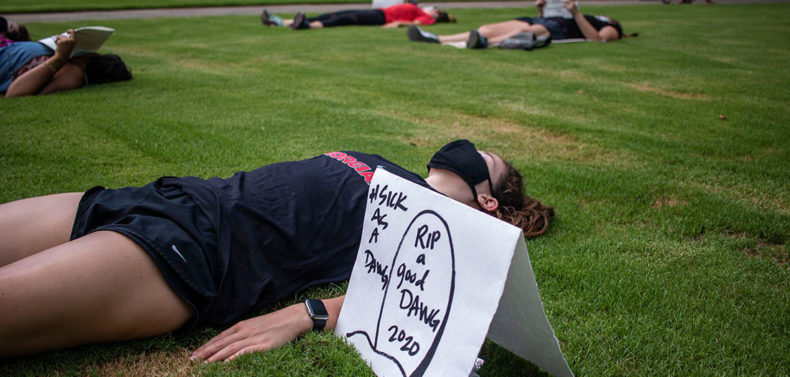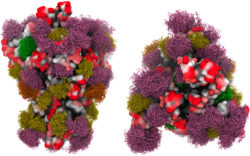As Athens braces for the return of UGA students and in-person classes Aug. 20, the data trends continue to show no sign of COVID-19 improvement. The Athens-Clarke County government’s attempts to curtail further spread of the disease by moving last call at bars to 10 p.m. has been met with a court challenge, and faculty, staff and students alike are criticizing UGA’s reopening plans.
A Stressed System
Athens’ COVID-19 cases continue to rise at alarming rates, with cases more than quadrupling in July. As of Aug. 11, Clarke County had 2,117 confirmed cases and 19 deaths, adding four additional deaths in the past two weeks. Before the July 4th weekend, Athens had roughly 400 cases cumulatively since the onset of the pandemic.
Amber Schmidtke, a public health microbiologist who has been monitoring the COVID-19 situation and produces a daily newsletter explaining the Georgia Department of Public Health’s pandemic data, says there are several concerning trends in the data. For one, she says, we’re still seeing a 12–13% positivity rate. The World Health Organization (WHO) recommends being at or below a 5% positive rate because that signals that you’re testing widely enough that asymptomatic cases are not being missed.
Also, while people are continuing to seek out testing, there is still a lag in getting appointments and significant lag time in getting back test results. A look at the data suggests that the 14-day window—the best indicating data we have for how we are doing with the pandemic—isn’t giving an accurate picture of things anymore. While real-time data will never be available on who is sick because people don’t get exposed, display symptoms, seek testing and get a result on the same day, the 14-day window usually serves as a lagging indicator, with the very best and most accurate data being roughly two weeks old.
“What stands out in my mind is that we seem to have hit a wall for testing,” Schmidtke says. “[A look at the DPH graph shows] that what has been a 14-day window may actually need to be a 21-day window right now. We are undercounting information even three weeks into the past because of testing backlogs.
“We have people that are waiting hours to get a test. We have people that are waiting weeks to get the results,” she says. “That complicates everything not just from getting an accurate count but also in terms of doing any sort of contact tracing. If a person’s test result comes back three weeks later and the contract tracer calls and asks ‘Who did you run into a month ago?’ nobody is going to be able to report that information. Most people can’t remember what they had for dinner last night, so to recall names and addresses of people that they came into contact with [a month ago] is going to be a nightmare.”
ACC Faces Pushback
While the case numbers have been on the rise, ACC Mayor Kelly Girtz says Athens is still in a good position compared to other metro areas in the state. Those who are new to Athens or returning after many months away should be aware that there is a mandatory mask requirement in public for Athens. Girtz further urged everyone to remain vigilant in helping the community curb the spread of Covid-19.
“I do think that the data shows that relative to other metro areas in the state, the Athens population has been acting safely, and we want that to persist,” Girtz says. “Obviously, we ask that you wear your mask anytime indoors or if you are clustered outdoors in a way that you are in close proximity to other people, [such as] waiting to cross a busy crosswalk or lined up outside to get coffee near other people.”
In an effort to curb further spread of Covid-19 and in anticipation of students returning to Athens, the ACC Commission passed an ordinance to move last call up to 10 p.m. and further enhanced the mask mandate to include mandatory mask wearing when people are standing in bars, but it was met with a lawsuit from bar owners the next day. A judge issued a temporary order blocking ACC from enforcing the earlier last call or the mask ordinance. A hearing is scheduled for Aug. 14.
Assuming the mask ordinance is upheld, “We will continue to enforce the mask mandate as we always have—by education,” Girtz says. “We bought tens of thousands of masks to distribute, so if you are in one of those situations that I just described and you don’t have a mask on, don’t be surprised if one of our employees says here is one for you. The goal at the outset was to spend at least a month just doing education and [mask] distribution. Given the legal landscape with the governor’s lawsuit against Mayor Bottoms and the Atlanta City Council, we are just going to continue to use education and distribution [as a means of enforcement.]”
Ultimately, Girtz hopes students and others who choose to go out to bars or restaurants are mindful of their behavior. “I understand people’s social needs completely. I understand cultural norms around bar behavior,” he says. “I can’t even begin to count the number of nights I’ve spent in bars in this town, but I will say that glomming up at the bar or close to other people, particularly as people are increasingly tipsy throughout the course of the evening, is simply not safe.
“Be very diligent about how you conduct yourself,” he adds. ”As many take-out options as you can use, as much outdoor activity as you can manage—those are clearly just safer ways to operate.”
UGA’s Plan Questioned
UGA’s latest release of information and guidelines for how they are preparing to reopen campus for face-to-face classes has been criticized by faculty and staff for lacking detail and clarity. While the University System of Georgia (USG) did approve a mask mandate for all buildings on campus in July, many other factors of the reopening plans were deemed inadequate by the Franklin College Faculty Senate and Mary Frances Early College of Education Faculty Senate in a resolution sent to UGA President Jere Morehead and USG Chancellor Steve Wrigley:
“It is deeply regrettable that the UGA and USG administrations have brought us so close to the opening of the Fall semester without a clear community understanding of the issues above,” the resolution states. “Furthermore, these issues by no means exhaust the list of unanswered concerns, many of them literal matters of life and death, held by staff, students, and faculty. It has become clear to all that the glaring failures of governance at The University of Georgia during the COVID-19 crisis are a direct result of decades of persistent narrowing of authority at the University into the hands of a tiny cluster of executives, all while excluding the inherent expertise and commitment held by the community itself. Democratic reform of University governance is long overdue.”
Among the issues faculty cited: UGA only plans to test 300 people per day, and they’re not being given the option of teaching classes online. Nor is there a clear mechanism for enforcing the mask mandate.
The resolution received a stern response from Morehead and Wrigley calling the resolution “unsubstantiated and inappropriate,” but it also resulted in a webinar meant to help address some of the remaining questions that faculty and staff had. The webinar, however, did not provide enough answers for many in the UGA community. Following the webinar, UGA’s staff union, United Campus Workers of Georgia (UCWG) further criticized the university’s plans for reopening and their failure to acknowledge the COVID-19-related death of a staff member last week.
Last week, UCWG sent out a link to a GoFundMe account for the recently deceased staff member’s family, claiming that her death was due to COVID-19. Ana Cabrera, a 32-year-old campus maintenance worker, had worked at Brumby Hall, records show. In response to Flagpole’s inquiry about the death, UGA’s Gregory Trevor, interim Senior Executive Director for Marketing and Communications, issued a brief statement that acknowledged her death, but not the cause.
“We are deeply saddened by the loss of a member of the University of Georgia community,” said Trevor. “Our sympathy goes out to our co-worker’s family and friends. Out of respect for them, we will not comment further. We are not in a position to confirm the cause of death. The university does not determine the cause of death when we tragically lose a member of our community.”
Despite what all of the health data shows about cases increasing here locally and statewide, the associated dangers, and calls for online-only classes from many public health professionals and experts around the state, there has been no indication that an online-only class plan is up for discussion. New information that has emerged this week via an open records request shows that there may be a reason for that. As often is the case, it comes down to money. According to internal USG memos, a private company known as Corvias that constructs, manages and finances students housing at nine USG schools through a public-private partnership (P3) declared their intention to interpret CDC guidelines in a way that would encourage dorms to be filled to near-maximum capacity. UGA doesn’t have a P3 dorm, but it still stands to lose hundreds of millions of dollars in housing, parking, dining and football revenue if students aren’t on campus.
So where does this leave the Athens community? With a lot of lingering questions and worries going forward. Check back next week for updates.
Like what you just read? Support Flagpole by making a donation today. Every dollar you give helps fund our ongoing mission to provide Athens with quality, independent journalism.










